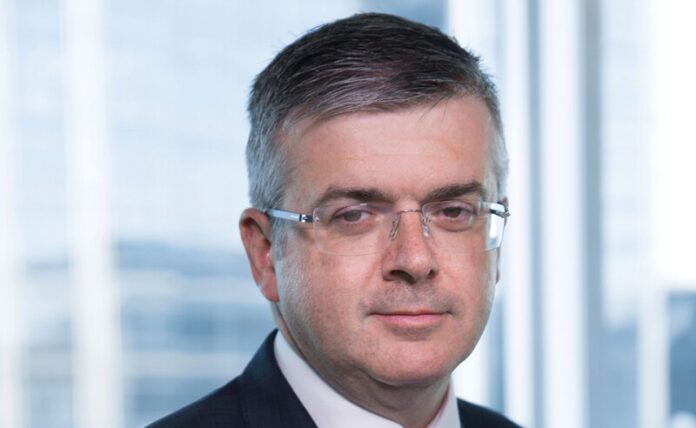In a move signaling a major shift in the UK’s approach to its post-Brexit relationship with the European Union, the British government has appointed Michael Ellam as the lead official for discussions with the EU and other international forums, including the G7 and G20. This appointment marks the latest step in the UK’s ongoing efforts to reset its relationship with the EU and strengthen its ties in key areas such as trade, security, and economic cooperation. Ellam’s role is critical to the success of the UK’s “Plan for Change,” a strategic framework designed to enhance the nation’s economic growth and national security.
Michael Ellam, who will officially take up his post on January 13, 2025, is tasked with overseeing official-level discussions with the EU and managing the EU Relations Secretariat, a new body established by Prime Minister Rishi Sunak in July 2024. The Secretariat’s primary objective is to facilitate the UK’s re-engagement with the EU after the tumultuous Brexit period, addressing issues such as trade barriers, security concerns, and shared global challenges like illegal migration. Ellam’s leadership and expertise will be instrumental in advancing these goals, contributing to the UK’s efforts to improve its position on the international stage.
Nick Thomas-Symonds, the Minister for the Cabinet Office, expressed his enthusiasm for Ellam’s appointment, emphasizing that his vast experience at the highest levels of international finance would be a valuable asset in helping the UK navigate its post-Brexit landscape. Thomas-Symonds highlighted the importance of resetting the UK-EU relationship to foster economic growth, improve national security, and tackle challenges that transcend national borders. According to Thomas-Symonds, Ellam’s extensive background, which includes key leadership roles at HSBC and HM Treasury, will significantly benefit the UK in its efforts to achieve these objectives.
Cabinet Secretary Sir Chris Wormald also welcomed Ellam back to the Civil Service, recognizing his previous leadership roles and noting that his return would bolster the UK’s economic and security interests. Wormald emphasized that Ellam’s wealth of experience would be critical in driving the UK’s efforts to address issues such as illegal migration, economic growth, and security challenges, all of which require close collaboration with the EU and other international partners.
For his part, Ellam expressed his enthusiasm for the role, stating that he was eager to return to the Civil Service after a decade in the private sector. Having previously served as the media chief for former Prime Minister Gordon Brown, Ellam brings a unique blend of public service experience and private sector expertise to his new position. As the Chairman of Public Sector Banking at HSBC, Ellam has gained valuable insight into international economic affairs, which will be essential in navigating the complexities of the UK’s relationship with the EU and other global partners.
One of the immediate challenges that Ellam and his team will need to address is the issue faced by British citizens traveling within the Schengen Area post-Brexit. Since the UK’s departure from the EU, British nationals are subject to the 90-day rule when traveling to countries in the Schengen Zone. This rule stipulates that UK citizens can only stay within the Schengen Area for up to 90 days within any 180-day period, regardless of how many countries they visit. The Schengen Area includes 27 European countries, such as Austria, Belgium, France, Germany, Spain, and Sweden, among others.
For British travelers, this rule has posed challenges, particularly for those with property or business interests within the Schengen Area. The 90-day limit restricts their ability to stay longer in these countries without facing penalties or being required to leave and re-enter. Furthermore, the “rolling” nature of the 180-day period, which is constantly updated with each trip, adds an element of complexity for travelers trying to calculate the number of days they’ve spent within the Schengen Area.
To help address this issue, the UK government is working on ways to streamline the process for British citizens traveling to or living in the Schengen Area, as part of its broader efforts to reset its relationship with the EU. The aim is to ensure that British nationals have the necessary access and flexibility to continue engaging with Europe for both personal and business purposes, while respecting the legal framework established after Brexit.
For British nationals, understanding the 90-day limit is crucial. Travelers are advised to carefully track their trips to Schengen countries to avoid overstaying their permitted duration. One way to ensure compliance is by checking the dates stamped in their passports when they enter and exit Schengen countries. Travelers can calculate the number of days spent within the Schengen Area by counting back 180 days from their planned departure date and adding up the days spent in the region. If the total number of days exceeds 90, they will need to adjust their travel plans accordingly.
While this rule is a significant issue for many British citizens, it is just one aspect of the broader challenges the UK faces in its post-Brexit relationship with the EU. The new role for Michael Ellam comes at a crucial time for the UK government as it seeks to reshape its engagement with Europe, focusing on areas such as trade, security, and migration. The Prime Minister’s “Plan for Change” lays the groundwork for these efforts, with a clear focus on improving the lives of British people by fostering economic growth and enhancing national security.
Ellam’s leadership in this new role will be instrumental in ensuring that the UK’s relationship with the EU is both productive and mutually beneficial. By addressing key issues such as trade barriers, security cooperation, and the movement of people, the UK hopes to reset its position on the global stage and secure closer links with its European neighbors.





